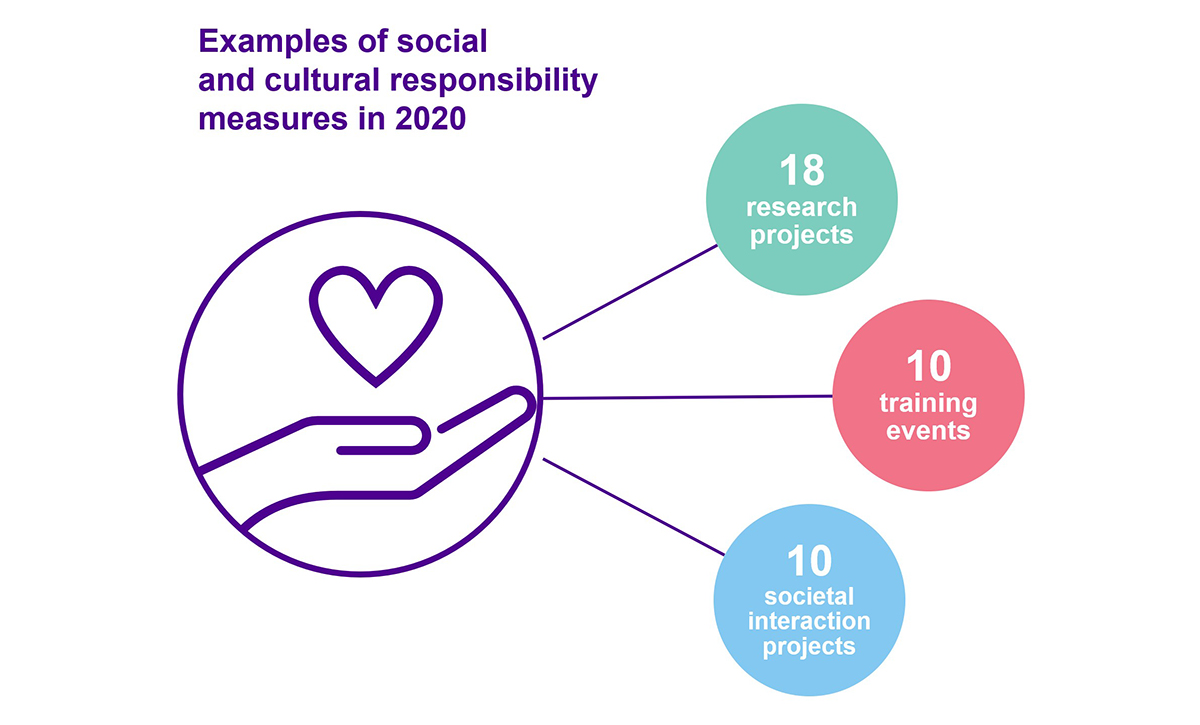
SDG 1 NO POVERTY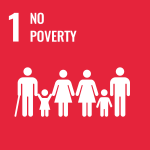
The Housing in Change project explores residential environments that meet people’s needs
Housing in Change is a two-year research project (2020-2022) funded by the Western Finland Public Benefit Housing Foundation and YH Kodit housing company.
There are major social, demographic and environmental changes underway that will have a significant impact on the needs that our living environment must meet. For example, urbanisation, climate change, changes in family structure and working life, teleworking and population ageing are affecting the use of living spaces, facilities and services.
All of these factors create new tensions between housing-related privacy and community solutions. The Housing in Change project examines how the living environment can holistically respond to residents’ needs amidst changing situations at the neighbourhood and individual dwelling scale.
Read more about the Housing in Change project.
SDG 3 GOOD HEALTH AND WELL-BEING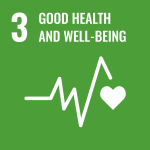
Covid-19 pandemic accelerates multidisciplinary research on the health effects of indoor air quality
To prevent the spread of the SARS-CoV-2 virus, it is important to maintain good indoor air quality and protect the health and safety of people in different indoor environments.
Licence to Breathe (L2B) is a multidisciplinary consortium comprising researchers and companies that was established to facilitate and speed up the sharing of research-based knowledge and experiences with companies. Multidisciplinary collaboration is a responsible course of action for addressing the challenges posed by the Covid-19 pandemic.
Following the Covid-19 outbreak, the L2B consortium has adopted an increasingly multidisciplinary approach for delving into the topic of healthy indoor environments. The consortium has two grant proposals in the pipeline concerning the study of the role of built environments in preventing pandemics.
Read more about License to Breathe (in Finnish).
The Rescue project improves society’s ability to cope with crises
Real Estate and Sustainable Crisis Management in Urban Environments (Rescue) is a multidisciplinary research project that is funded by the Academy of Finland and runs from 2020 to 2023. The project promotes the dynamic resilience and crisis preparedness of societies by examining the role of real estate in responding to predictable and unexpected crises both nationally and internationally.
The project, conducted by Aalto University in collaboration with Tampere University and the University of Turku, seeks to improve our understanding of how facilities, buildings and land use should be designed, used and managed to help various stakeholders respond to different types of crises, such as a pandemic, climate change, terrorism, fires and floods.
Read more about the Rescue project.
Rethinking dialogue in social services and health care to improve leadership, well-being and productivity
The SoteDialogit project was launched to develop expertise, enhance quality, customer orientation and customer safety, support employees’ well-being and work capability and promote organisational renewal and professional development in partner organisations in the social services and health care sector.
The project is a collaborative effort involving the Work Research Centre in the Faculty of Social Sciences at Tampere University, the University of Eastern Finland, Seinäjoki University of Applied Sciences and Lapland University of Applied Sciences. The project is funded by the European Social Fund (ESF).
Read more about the SoteDialogit project.
SDG 4 QUALITY EDUCATION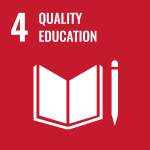
Y campus leads the way to sustainable entrepreneurship
The Sustainability & Impact Club pilot project, which was carried out by Y campus at Tampere Universities in 2020, provided students with the opportunity to explore sustainable entrepreneurship. The starting point for the learning challenges was climate change.
As part of the club’s activities, a number of events were held to give students the chance to talk with entrepreneurs as well as sustainable entrepreneurship and climate change specialists.
Read more about the Sustainability & Impact Club.
Closing the knowledge gap through international knowledge exchange
The ARCH4FUTURE project supports the transition to a carbon-neutral society by creating opportunities for the exchange of knowledge and expertise between Finland and China. The goal is to diversify access to information and tools through a digital platform. In addition, the project seeks solutions for addressing skills gaps between students and teachers in the two countries.
Cooperation in Tanzania supports local publishing
In April 2019, Mikko J. Ruohonen organised a conference on sustainable ICT, education and learning on the island of Zanzibar, Tanzania, in collaboration with a local university.
Following the conference, a publication featuring several teachers and scholars from the State University of Zanzibar appeared for the first time in an international series.
Read more about Sustainable ICT, Education and Learning.
Article examines the challenges created by sustainability requirements in Finnish universities
An article titled Tensions in the Sustainability of Higher Education — The Case of Finnish Universities authored by Annina Lattu and Yuzhuo Cai discusses the sustainability tensions that exist in Finnish universities and how they can be addressed.
Besides being increasingly engaged in marketisation, universities are expected to improve their sustainability performance and become agents of change that lead the way in sustainable development.
The article introduces an analytical framework, originally developed by Hahn et al. (2015), for understanding tensions relating to corporate sustainability in the context of the Finnish higher education system in order to answer the following questions: What are the tensions relating to social and economic sustainability in Finnish universities? What strategies could universities use to respond to these tensions?
Easy access to information about sustainability courses and modules
Sustainable development is a part of the common learning outcomes at Tampere Universities and should be reflected in all degrees in some form. Students who are looking to gain a better understanding of sustainability can attend a broad range of courses and modules that are offered by Tampere University or university networks. In 2020, the courses and modules were listed on the University’s website and the online Student’s Guide to help students find them.
The majority of the sustainability courses are widely available to students enrolled in different degree programmes.
Read more about the courses exploring sustainable development themes.
Ready-made materials help teachers integrate sustainability into their courses
The website of the Teaching and Learning Centre (TLC) of Tampere Universities was launched in the autumn in 2020. Among other things, the website provides teachers with information and resources for embedding sustainability into education.
Read more about TLC’s teaching materials on sustainable development (in Finnish).
Embedding sustainability into the curriculum
In 2020, the integration of sustainable development into all fields of study was discussed twice by the Education Council of Tampere University.
The efforts to integrate sustainability into education continue in 2021–2022 with an assessment of how our course offerings respond to the UN Sustainable Development Goals.
Courses on sustainable entrepreneurship
Major steps were taken in 2020 to prepare for the transformation of Y campus, which offered courses in entrepreneurship to students at Tampere Universities, into a new hub of sustainable entrepreneurship. Y campus was transformed into HUBS in early 2021.
Among other things, HUBS offers students a minor in sustainable entrepreneurship as well as opportunities to carry out multidisciplinary sustainable development projects in collaboration with different organisations and companies.
SDG 5 GENDER EQUALITY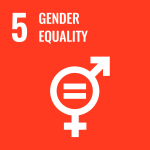
Tampere University raises a flag for gender and sexuality minorities
The student union TREY and Tampere University raised the rainbow flag to show support for gender and sexual minorities during Pride Week on Saturday 12 September 2021.
Tampere University has a zero tolerance approach to all forms of discrimination, misogyny and harassment. The University and the student union are committed to promoting equality in all their endeavours and providing a safe environment for all the members of the university community.
By marking Pride Week, we raise awareness of and celebrate diversity.
The student union TREY and Tampere University engage in active cooperation in support of sexual and gender minorities.
Read more about the raising of rainbow flag.
Tampere University takes a strong stance against discrimination, misogyny and harassment
There is no room for discrimination, misogyny or harassment at Tampere University, declared the representatives of Tampere University and the student union TREY in December 2020.
Both the University and the student union are committed to promoting equality in all their activities and making the university community a safe place for everyone to study and work in. The statement was an immediate response to the experiences of harassment and unequal treatment reported by members of the university community.
Tampere University participated in UN campaign to end violence against women
Tampere University participated in the UN Orange the World campaign, during which various events were organised to end violence against women. As part of the campaign, landmarks around the world were illuminated in orange. Orange was also the colour of the work of light projected on the façade of the Main building on the city centre campus.
The Orange the World campaign started on 25 November, the International Day for the Elimination of Violence against Women. The 16-day campaign concluded on the International Human Rights Day on 10 December 2020.
Study develops educators’ preparedness to confront gender-based violence
A multidisciplinary research project titled Education and Raising Awareness in Schools to Prevent and Encounter Gender-Based Violence (ERASE GBV) is carried out with partners from three European countries: Finland, Spain and Croatia. The project investigates institutional and affective practices for responding to gender-based violence in schools.
The project participants develop a web-based training programme to increase awareness of and improve the ability of educators to prevent and address gender-based violence in schools. In addition, teachers, student teachers and other professionals working in schools are trained to recognise and support children and young people who are exposed to gender-based violence, abuse or harassment, refer them to further services and help them report abuse and violence to the public authorities.
Read more about the ERASE GBV project.
Study looks into gendered practices within the European Parliament
A research project titled Gender, party politics and democracy in Europe: A study of European Parliament’s party groups (EUGenDem), which is funded by the European Research Council (ERC), is carried out to systematically analyse the gendered policies and practices that exist within the political groups in the European Parliament (EP). The project entails a comparative study of the political groups and provides insights into the significance of gender in the current political party transformations in Europe. The project examines the policies of selected party groups to generate information about gender equality relating to economics, social rights and moral policy.
Read more about the EugenDem project.
Study sheds light on links between sex, power and corporatism
The research project Gender, Power and Reconfigured Corporatism in Finland (GePoCo) explores the nexus between corporatism, power and gender. The project provides insights into the challenges that surround the tripartite cooperation between trade unions, employers’ organisations and the government.
Considering the crucial role played by the corporatist system in Finland, there has been very limited research examining its gendered practices in relation to different policy fields or as gendered organisations and decision-making. The GePoCo project will address these questions by conducting empirical research at local, national and transnational levels.
Read more aout the GePoCo project.
SDG 6 CLEAN WATER AND SANITATION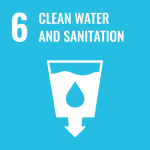
The Environmental Health research group supports pandemic preparedness
Climate change and population growth could cause the global demand for raw materials, most importantly for clean water and fertile soil, to outpace supply in the future. Climate change is also estimated to increase the incidence of infectious diseases and the spread of pathogens as it increases extreme weather events that can lead to overflows that contaminate water supplies.
Lack of clean water is already affecting large parts of the globe. Infectious diseases caused by bacteria, viruses, protozoa and parasitic worms are the most important and common global health risks associated with drinking water. With the help of advanced microbiological analytics, we can prepare for both naturally occurring and manmade outbreaks.
The Environmental Health research group at Tampere University explores these topics in collaboration with a broad range of partners.
Read more about the research carried out by the Environmental Health group.
SDG 8 DECENT WORK AND ECONOMIC GROWTH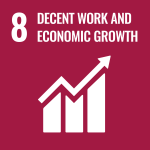
Project improves the safety and well-being of gig workers
A research project titled Sustainable Gig Work seeks to improve occupational safety, health and well-being among gig workers as well as within staffing agencies and SMEs that employ gig workers and thereby improve productivity and competitiveness. The project is a collaborative undertaking involving Tampere University, Metropolia University of Applied Sciences, the University of Oulu and Satakunta University of Applied Sciences. The project is funded by the European Social Fund (ESF).
Read more about the Sustainable Gig Work project (in Finnish).
SDG 10 REDUCED INEQUALITIES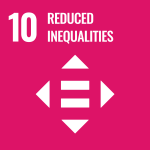
Online course on digital equality is open to all
The first English-language Massive Open Online Course (MOOC) that was offered by Tampere University in 2020 delved into the social sustainability of digital services. The course examined how ever-increasing and expanding digital services can be organised and implemented in a way that makes them equally accessible to everyone.
This course is part of the international Sustainable Digital Life Master’s programme, which began in 2021.
Read more about the course and the related Master’s Programme in Sustainable Digital Life.
The MUTABLE project looks into the translation process from an interactional perspective
The Multimodal Translation with the Blind (MUTABLE) project studies the translation process from an interactional and multimodal perspective by analysing teamwork in which sighted and blind describers work on audio descriptions face-to-face. An analysis of their teamwork will produce new knowledge of the interface between cognition and interaction, the use of multimodal resources while translating and working with visually asymmetrical participants, and of the expertise of blind or partially sighted team members.
Read more about the MUTABLE project.
SDG 11 SUSTAINABLE CITIES AND COMMUNITIES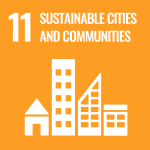
Building a sustainable city
Dwellers in Agile Cities is a research consortium funded by the Academy of Finland’s Strategic Research Council in the years 2016—2019. The consortium comprises more than 20 researchers from different institutions who are working on six subprojects focusing on sustainable urban development. The project is carried out to identify future megatrends and weak signals that are shaping the future of urbanisation.
Read more about the Dwellers in Agile Cities project.
Human-centric AI opens up new opportunities for improving accessibility
A project titled Human-Centered AI Solutions for the Smart City (KITE) focuses on the co-creation of AI solutions and their design methods in collaboration with companies by conducting applied research on human-centred technology.
The aim is to develop knowledge and skills for the design and development of AI solutions that are not only meaningful and understandable but also acceptable and ethically sustainable from the perspective of users. The targeted solution domains are chosen from the central AI application domains of the smart city, such as smart traffic, a city’s decision-making processes and sustainable development.
Read more about the KITE project.
Accessibility education brings us closer to equal services
The Tampere Accessibility Unit (TACCU) organised the Fundamentals of Accessibility course (5 ECTS credits) for the first time in 2020. The course provides an overview of how accessibility can be taken into account in everyday communications and digital services.
The course provides an introduction to the interlingual and intermodal methods used in translation and interpreting when providing accessibility services, such as subtitling, audio descriptions, sign-language and print interpreting and environmental descriptions as well as accessibility technologies, the needs of different groups and stakeholders and related legislative requirements.
The Fundamendals of Accessibility course is part of the comprehensive Accessibility in Digital Society (30 ECTS cr), which began in 2021.
Read more about the accessibility courses offered by TACCU.
SDG 12 RESPONSIBLE CONSUMPTION AND PRODUCTION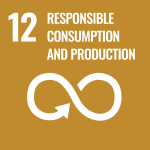
Course explores the building blocks of a sustainable city
A new course titled Living Lab: Circular City was offered in the academic year 2020/21 to students enrolled in degree programmes in environmental engineering at the Faculty of Engineering and Natural Sciences. Students attending the course envisioned what sustainable cities would look like and examined how their visions could be turned into reality.
Read more about the course in the online Student’s guide.
Research team explores accounting and reporting practices to build a more sustainable society
The fundamental question that the Sustainability and Critical Accounting research group at Tampere University is looking to answer is whether and how accounting practices can help to promote the transition to a just and socially and ecologically sustainable society.
The group is theoretically and methodologically open-minded and approaches research topics from a critical perspective. The group considers accounting to be a powerful social institution that has an impact on various levels of society. Interdisciplinarity is therefore a defining feature of the group’s research.
Read more about the research group’s activities and publications.
SDG 13 CLIMATE ACTION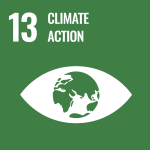
Using games to promote public engagement with climate change
The Our Planet at Play project aims to improve our understanding of the potential of games to promote public engagement with climate change. The ultimate goal is to develop, test and release a new digital game to promote citizen engagement with climate change and its causes, present and future impacts and climate actions. The project participants are committed to driving deep and lasting change by supporting cognitive, affective, and behavioural citizen engagement.
Read more about the Our Planet at Play project.
RoboCivics explores interactions between young people and social robots
RoboCivics is a project funded by the Academy of Finland. The main goal of the project is to create new scientific knowledge about the interaction models of persuasive social robots that can encourage civic participation among young people.
The RoboCivics project investigates how social robots can support and facilitate young people’s civic participation in the context of sustainable development. The project participants will co-design social robots in collaboration with young people aged 15 to 24 to gain an understanding of their preferred forms of interacting with social robots – with sustainable development as the application domain.
Initiative to organise entrance examinations to communications programmes remotely
The Communication Sciences unit at Tampere University has launched an initiative to organise entrance examinations, which are taken by applicants seeking admission to degree programmes in communications, in a fully virtual format. Entrance examinations were held remotely for the first time in 2020, and the practice is hoped to remain in place in the future.
SDG 15 LIFE ON LAND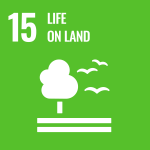
Preservation of biodiversity integrated into daily campus life
Campus Nature was a demo project conducted at Tampere University in 2019–2020. The project focused on developing and studying nature in a campus environment. The project resulted in the creation of new green spaces around the city centre campus that help to enhance biodiversity, promote collaboration and provide recreational opportunities. The project participants developed three campus nature demos: a green roof, two campus meadows and a vision for a roof garden. The demos were designed and put into practice in collaboration with students, staff and other members of the campus community.
Campus Nature was a collaborative project between the B2N research group, University Properties of Finland Ltd and Tampere University.
Read more about the Campus Nature project.
SDG 16 PEACE, JUSTICE AND STRONG INSTITUTIONS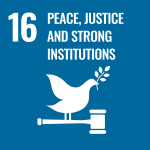
Improving accessibility with the help of comics
The multidisciplinary Sarjis research group at Tampere University is looking for ways to develop the accessibility of legal documents and determine whether the visualisation of documents can contribute to the accessibility of information.
The Word to Image research project studies the visualisation of social welfare documents. The research project examines whether the clarity and understandability – and, hence, accessibility – of the documents could be improved by converting them into comics.
The Graphic Justice research project tackles the problem by examining whether a comic-style document can be legally binding and whether the visual presentation of information can make documents easier to understand and therefore improve customers’ access to justice.
Both projects are carried out in collaboration between researchers in the Faculty of Social Sciences and the Faculty of Information Technology and Communication Sciences at Tampere University.
Read more about the projects of the Sarjis research group.
Interdisciplinary project promotes active citizenship among young people
ALL-YOUTH – All Youth Want to Rule Their World is a multidisciplinary research project that explores civic engagement among young people aged 16 to 25 and the related barriers and challenges. The project also examines young people’s views and visions of sustainable future, growth and well-being.
The project participants have collaborated with young people to develop a prototype of a digital online service called Digirati, which promotes young people’s influence on society and facilitates dialogue between policymakers and young people.
Sustainable welfare through collaboration between public administration, businesses and citizens
Climate change is challenging welfare states, such as Finland, to adjust their practices. How can we steer the transition to an environmentally sustainable welfare state? The ORSI project investigates fair and robust methods for making our society more environmentally sustainable.
The ORSI project explores governance and budgeting, everyday participation, sustainable innovation, and the guidance of consumption choices. The aim is to bring citizens, policymakers and businesses together to address these issues.
In 2020, the participants of the ORSI project not only conducted research but also engaged in active interactions with societal stakeholders to promote the creation of a sustainable eco-welfare state.
ORSI is a collaborative undertaking between Tampere University, the Finnish Environment Institute (SYKE), Aalto University and the VTT Technical Research Centre of Finland.
Read more about the ORSI project.
New website provides an overview of our sustainable development activities
In 2020, we launched a website that provides an overview of all the sustainable development activities that are carried out across Tampere Universities. Among other things, the website lists our research groups and projects that focus on sustainable development and describes the different forms of collaborating with external stakeholders and delivering impact for society.
Read more about our sustainable development activities.
Promoting sustainable development is a collaborative effort across the Tampere Universities community
In the autumn of 2020, Tampere Universities conducted an extensive co-creation survey among students, teachers, researchers and support staff to build an overall understanding of ongoing sustainable development activities and their goals.
In addition, we organised a series of events on sustainability, such as the Leadership Symposium with a sustainable development theme, a student roundtable, and a pre-hack meeting before the sustainability hackathon held in January 2021.
SDG 17 PARTNERSHIPS FOR THE GOALS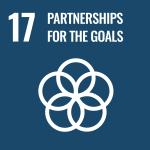
Sprint offers students the opportunity to solve real sustainability challenges
The Sprint Innovation Festival brings together students and organisations to address sustainability challenges. The event is an opportunity for students to showcase their skills and connect with potential employers and students from different fields.
The event is also a weeklong intensive course (2 ECTS) that entails a pre-assignment and innovation activities carried out by student teams.
At the end of the course, the student teams present their solutions to a jury that selects the best ideas. The winning teams are awarded at a festive closing gala.
Read more about the Sprint Innovation Festival.
THE Impact Rankings support the University’s work towards greater sustainability
Tampere University took part in the Times Higher Education (THE) Impact Rankings for the first time in the autumn of 2020 to further develop its sustainable development activities. The rankings measure institutions’ success in delivering the UN Sustainable Development Goals.
Tampere University’s overall ranking placed it among the top 400. Eight Finnish universities were included in the ranking, with only two universities ahead of those ranked among the top 400.
Read more about Tampere University’s performance in the Impact Rankings.
